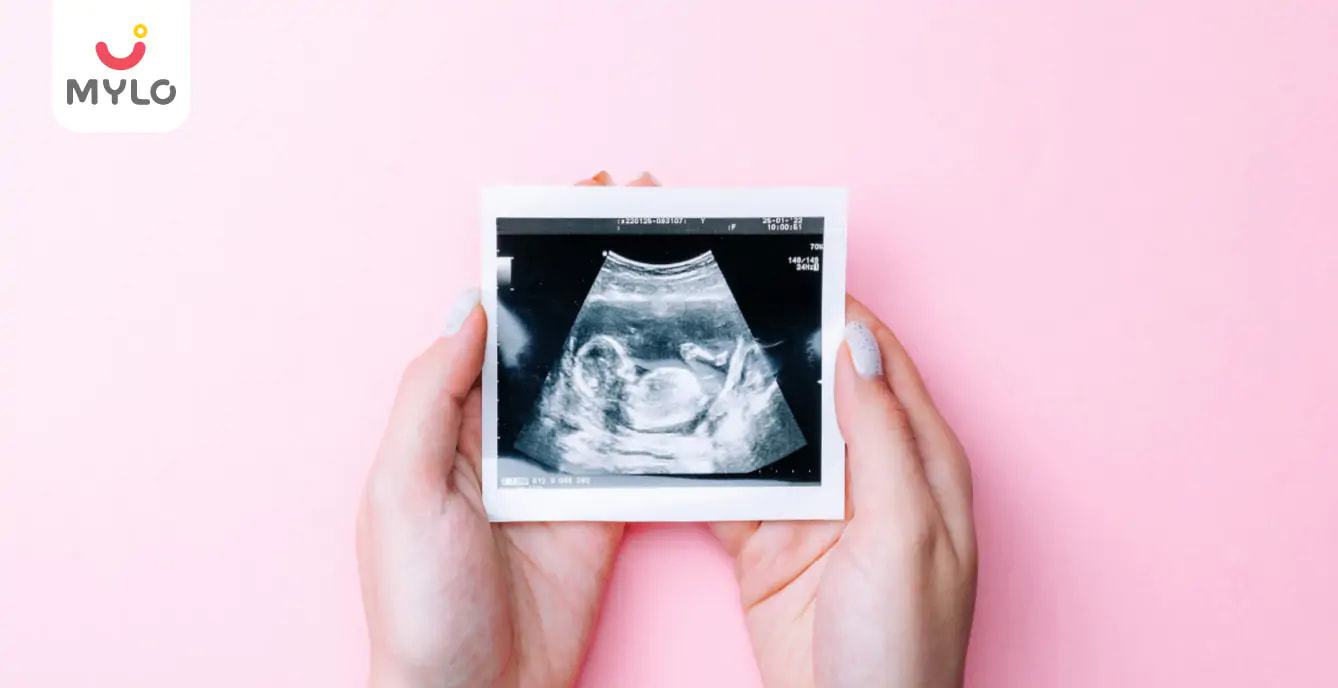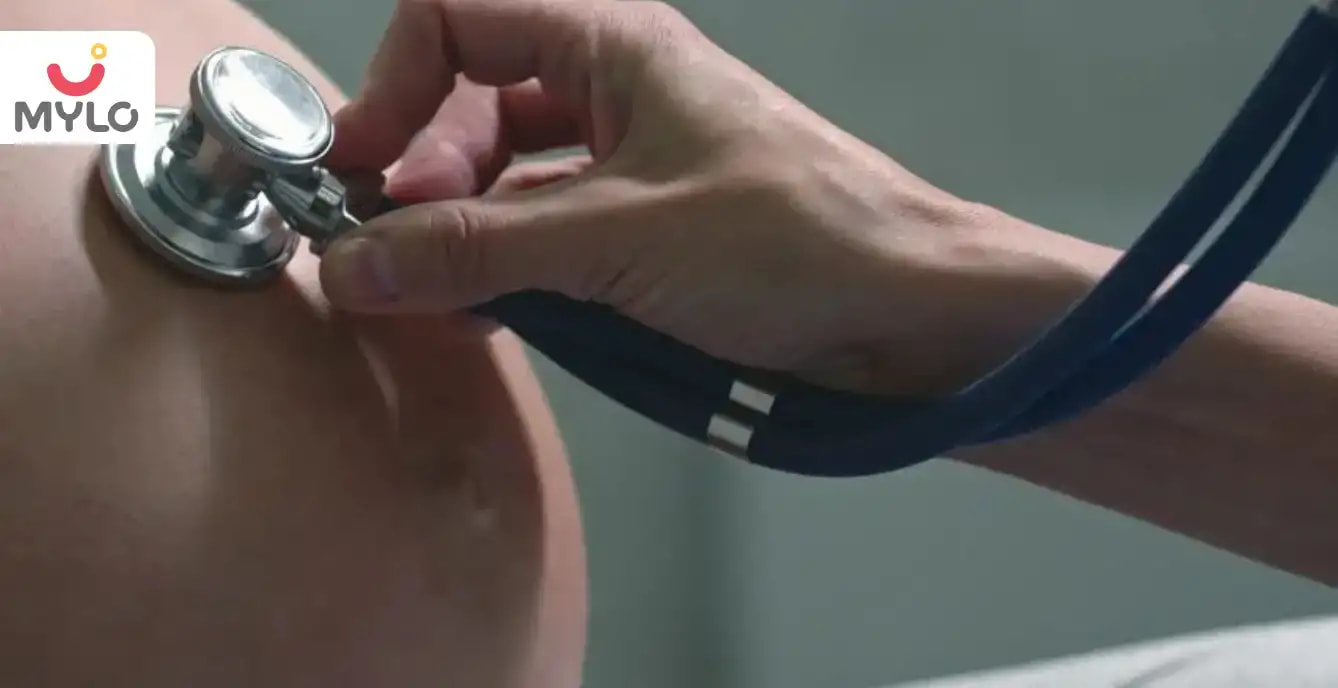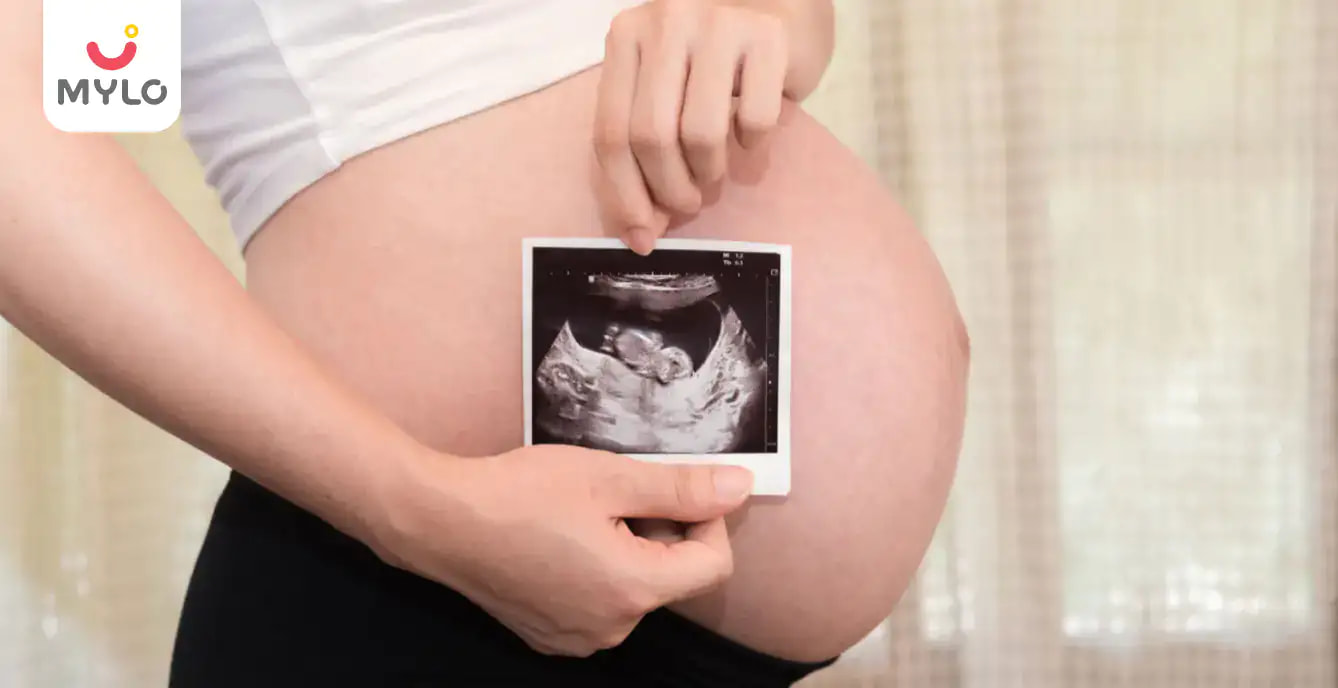Home

9 Week Ultrasound: What to Expect & What are the Red Signals?
In this Article

9 Week Ultrasound: What to Expect & What are the Red Signals?
Updated on 2 April 2024



Medically Reviewed by
Dr. Shruti Tanwar
C-section & gynae problems - MBBS| MS (OBS & Gynae)
View Profile

If you’re 9 weeks pregnant, then you have already started the third month of your pregnancy and are only a few weeks away from the second trimester. Exciting things should start happening around the ninth week of pregnancy, much of which you can witness at your 9 weeks pregnant ultrasound.
In this article, we will discuss what you can expect from your ultrasound at nine weeks of pregnancy, fetal growth and development at this time, the changes taking place in your body during this time and the red flags you should keep an eye out for.
What is the Purpose of a 9 Week Ultrasound?
Most women have their first ultrasound during 6 to 8 weeks of pregnancy. But depending on your unique pregnancy, you may have your first ultrasound at 9 weeks or it could be your second. If this is your first ultrasound, the doctor will confirm your due date and discuss with you about your pregnancy journey in detail.
Your doctor may recommend an ultrasound at this time if you have been experiencing some unusual symptoms like vaginal bleeding or have miscarried in the past. Nonetheless, a 9 weeks ultrasound will help confirm if your pregnancy is progressing well or not.
9 Weeks Pregnant Ultrasound: What to Expect?
An ultrasound at nine weeks is usually done transvaginally, meaning the doctor will insert a probe into your vagina because your uterus is still sitting behind your pelvic bone. (Don’t worry, it won’t hurt.) You may experience slight discomfort but that will be gone as soon as you see your little angel on the screen.
At the ultrasound, you will be able to see your baby’s head, limbs and body. You will also hear their heartbeat for the first time with a Doppler. Even though your baby's genitals are starting to take shape, the ultrasound at 9 weeks will not be able to tell you anything about the baby's gender just yet.
9 Week Ultrasound Twins: What to Expect?
If you’re expecting twins, then your joy is about to double. During your twin pregnancy 9 weeks ultrasound, the doctor will confirm the presence of two gestational sacs and two fetal poles. The ultrasound will show how the twins are developing, including two heartbeats and two measurements of the crown-rump length.
At the 9 weeks pregnant twins ultrasound, the doctor will also check for any signs of complications such as vanishing twin syndrome or twin-to-twin transfusion syndrome. Don’t forget to ask your doctor about any special precautions you may need to take for your twin pregnancy.
How to Interpret a 9 Weeks Pregnant Ultrasound Report?
Interpreting a 9-week pregnant ultrasound report involves understanding the key findings and assessing the progress of the pregnancy. Here are the points to consider:
1. Due date confirmation
The week 9 ultrasound helps confirm the estimated due date by measuring the size of the gestational sac or the embryo.
2. Fetal development
The report will indicate the presence of the baby's head, limbs, and body, showing that the basic structures are forming.
3. Vital signs
The ultrasound will record the baby's heartbeat, which is typically around 160 beats per minute at this stage. This indicates a healthy heart.
You may also like: Can Fetal Heartbeat Disappear and Reappear?
4. Physical features
The 9 weeks ultrasound may show the formation of hair follicles, nipples, and more pronounced ears, indicating the ongoing development of the baby.
5. Umbilical cord function
The report may mention the functionality of the umbilical cord, which is responsible for supplying oxygen and nutrients to the baby's developing body.
It's important to consult with a healthcare professional or an obstetrician/gynecologist for a detailed interpretation of the ultrasound report. They will have the expertise to explain the findings accurately and address any concerns or questions you may have related to your 9 week ultrasound.
Fetal Growth and Development at 9 Weeks Pregnant
At 9 weeks, your baby has graduated from an embryo to a fetus—and is about the size of a cherry. Your baby is developing fast, growing roughly 3.1 cm (twice the size it was last week!) at the end of the ninth week.
-
Slowly and steadily your baby is taking fundamental strides and has now developed elbows which help him/her move their arms about.
-
At 9 weeks, your baby’s hair follicles have appeared and so have nipples.
-
Your baby's eyelids are still shut and will continue to be so for a while, nonetheless, those little ears are now more pronounced and protruding.
-
Your baby's heartbeat is around 160 per minute (twice as fast as adults’) and their heart is now divided into four chambers. The valves which help the blood go in and out are starting to form.
-
The umbilical cord also has a full-time job now of carrying blood to the baby's heart while the arteries are at work carrying the blood from the heart to the placenta.
-
The placenta can produce nutrition and remove waste materials from the developing baby. Additionally, it is now able to assist the creation of hormones, which is a duty that is of the utmost importance.
Symptoms You May Experience at 9 Weeks Pregnant
Here are some symptoms that you may experience during the ninth week of your pregnancy:
1. Weight gain
You may have noticed that you've put on some weight, particularly around the middle. It is a frequent occurrence when you are in the ninth week of your pregnancy, and the reason for it is most likely water retention.
2. Fatigue
You might still experience exhaustion because your energy reserves facilitate the formation of the placenta and the continued support of the fetus and its growth.
3. Decline in blood sugar and pressure
Because of the increases in your metabolic rate and hormone levels, it is also possible that you might feel a decline in both your blood sugar levels and your blood pressure.
4. Indigestion
The hormones your pregnancy produces slow down your digestion because of this, you can have more indigestion, heartburn, bloating and constipation.
5. Changes in your breasts
You may notice that your breasts are becoming fuller, and your nipples are getting darker around 9 weeks of pregnancy.
6. Food cravings
Around 9 weeks, you may also start having food cravings, and your emotions may be all over the place.
When Should You Seek Medical Attention?
You should contact your physician if you have any of the following symptoms during the ninth week of your pregnancy or any time in the first trimester:
-
Painful cramping and vaginal bleeding
-
Discharge from the uterus (more than usual)
-
Vaginal odour
-
Fever of 100.4 degrees Fahrenheit or higher
-
A burning sensation or discomfort during urination
-
Abdominal or pelvic pain
-
Any signs of anxiety or depression
-
Excess weight loss
-
Vomiting at least three times a day, with an inability to keep food or drink down.
-
Headaches that occur often
Tips for a Healthy Pregnancy
Besides going for your 9 week ultrasound, here are some tips you should follow throughout your pregnancy:
-
If you are experiencing symptoms of heartburn or indigestion, chewing sugar-free gum may be of some assistance to you.
-
In addition to that, steer clear of consuming meat, fish or eggs that are undercooked.
-
Steer clear of fish that are rich in mercury, such as swordfish, shark and king mackerel.
-
Before eating, thoroughly wash all of the fruits and vegetables.
-
Always be sure to keep your cutting boards and plates clean.
-
Be sure to take all your prenatal vitamins and supplements.
-
Don't consume alcohol during pregnancy or smoke or use drugs.
FAQs
1. Is a 9 week ultrasound 3D safe?
3D ultrasounds are generally considered safe during pregnancy when performed by a qualified medical professional for medical purposes. However, it's important to note that 3D ultrasounds are usually not part of routine prenatal exams.
2. Should I go for a 9 weeks pregnant 3D ultrasound?
A 9 week 3D ultrasound can provide you a clearer, more defined picture of your baby, who’s just a developing fetus yet. The decision to get a 3D ultrasound is personal but you can consult your gynecologist whether it is safe in your unique condition, about any potential risks and even the costs.
3. Can you see placenta on ultrasound 9 weeks?
Yes, the placenta can be seen on an ultrasound at 9 weeks of pregnancy. The placenta develops during early pregnancy and is usually visible on the week 9 ultrasound. The ultrasound can show the location and appearance of the placenta and provide information about its function.
Closing Thoughts
It's possible for you to not feel any different at 9 weeks pregnant than you felt the week before. However, your little one is growing rapidly and your 9 weeks pregnant ultrasound report is a testimony to all the growth. So, feel enthusiastic about your 9 weeks pregnant ultrasound and continue to make wonderful decisions for you and the baby.
References
1. Ulrich CC, Dewald O. (2022). Pregnancy Ultrasound Evaluation. NCBI
2. Pascual ZN, Langaker MD. (2022). Physiology, Pregnancy. NCBI
3. Murugan VA, Murphy BO, Dupuis C, Goldstein A, Kim YH. (2020). Role of ultrasound in the evaluation of first-trimester pregnancies in the acute setting. NCBI
4. Lutterodt MC, Kähler P, Kragstrup J, Nicolaisdottir DR, Siersma V, Ertmann RK. (2019). Examining to what extent pregnancy-related physical symptoms worry women in the first trimester of pregnancy. NCBI
Tags
9 Weeks Pregnant Ultrasound in Bengali, 9 Weeks Pregnant Ultrasound in Telugu, 9 Weeks Pregnant Ultrasound in Tamil





Medically Reviewed by
Dr. Shruti Tanwar
C-section & gynae problems - MBBS| MS (OBS & Gynae)
View Profile


Written by
Anupama Chadha
Anupama Chadha, born and raised in Delhi is a content writer who has written extensively for industries such as HR, Healthcare, Finance, Retail and Tech.
Read MoreGet baby's diet chart, and growth tips

Related Articles
Related Questions
Hello frnds..still no pain...doctor said head fix nhi hua hai..bt vagina me pain hai aur back pain bhi... anyone having same issues??

Kon kon c chije aisi hai jo pregnancy mei gas acidity jalan karti hain... Koi btayega plz bcz mujhe aksar khane ke baad hi samagh aata hai ki is chij se gas acidity jalan ho gyi hai. Please share your knowledge

I am 13 week pregnancy. Anyone having Storione-xt tablet. It better to have morning or night ???

Hlo to be moms....i hv a query...in my 9.5 wk i feel body joint pain like in ankle, knee, wrist, shoulder, toes....pain intensity is high...i cnt sleep....what should i do pls help....cn i cosult my doc.

Influenza and boostrix injection kisiko laga hai kya 8 month pregnancy me and q lagta hai ye plz reply me

RECENTLY PUBLISHED ARTICLES
our most recent articles

Drumstick During Pregnancy: The Ultimate Guide to Benefits & Side Effects

Abortion
How to Avoid Pregnancy After Missing Period Naturally?

1st Birthday Wishes for Nephew and Niece That Tug at the Heart

The Ultimate Collection of Baby Boy Names in Telugu

Common Health Problems
Navel Displacement: The Ultimate Guide to Causes, Symptoms & Treatment

TV & OTT
Top 10 Thriller Movies on Hotstar for Edge-of-Your-Seat Excitement
- 10 Best Pakistani Dramas of All Time
- Ear Infection During Pregnancy: Understanding the Risks and Remedies
- Freezing Sperm: Preserving the Possibility of Parenthood
- The Ultimate Guide to Ghee Massage for Babies
- Sunflower Seeds in Pregnancy: Advantages, Risks, & Recipes
- The Ultimate Guide on Cabbage During Pregnancy Benefits and Precautions
- Double Marker Test: Everything You Need to Know for a Healthy Pregnancy
- The Pros and Cons of Consuming Brinjal in Pregnancy
- Why You Should Consider Drinking Coconut Water During Pregnancy?
- Sneezing During Pregnancy: Causes, Risks and Treatment
- Comfort vs. Style: The Pros and Cons of Wearing Heels During Pregnancy
- A Mom-to-Be's Handbook to Safely Savoring Momos in Pregnancy
- Chicken During Pregnancy: The Ultimate Guide to Safe and Nutritious Eating
- How To Prepare Food For Your Infant/Toddler Safely? Here Are Some Tips That You Must Not Forget While Preparing Food


AWARDS AND RECOGNITION

Mylo wins Forbes D2C Disruptor award

Mylo wins The Economic Times Promising Brands 2022
AS SEEN IN

- Mylo Care: Effective and science-backed personal care and wellness solutions for a joyful you.
- Mylo Baby: Science-backed, gentle and effective personal care & hygiene range for your little one.
- Mylo Community: Trusted and empathetic community of 10mn+ parents and experts.
Product Categories
Baby Carrier | Baby Soap | Baby Wipes | Stretch Marks Cream | Baby Cream | Baby Shampoo | Baby Massage Oil | Baby Hair Oil | Stretch Marks Oil | Baby Body Wash | Baby Powder | Baby Lotion | Diaper Rash Cream | Newborn Diapers | Teether | Baby Kajal | Baby Diapers Pants | Cloth Diapers | Laundry Detergent | Lactation Granules |








